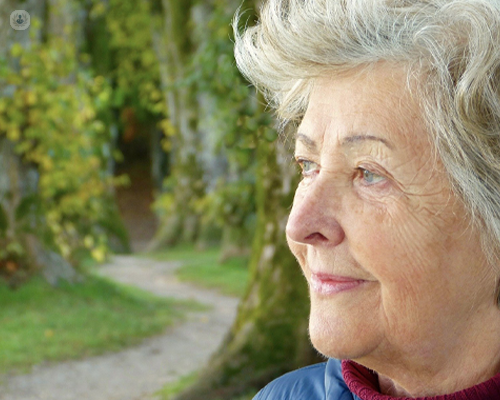Skin Cancer in older adults: Ocurrence and prevention advice
Written in association with:Skin cancer is a prevalent condition, particularly among older adults. Understanding the risks, ocurrence, and prevention methods is crucial for managing and reducing the incidence of this disease. Here, leading consultant dermatological surgeon Dr Raj Mallipeddi provides an overview of skin cancer in older adults, focusing on ocurrence and practical advice for prevention.

What is skin cancer?
Skin cancer is the abnormal growth of skin cells, usually caused by ultraviolet (UV) radiation from the sun or tanning beds. The three main types are:
- Basal cell carcinoma (BCC): The most common form, usually appearing as a small, shiny bump or patch.
- Squamous cell carcinoma (SCC): This type of skin cancer can present as a red, scaly patch or sore. It may crust or bleed.
- Melanoma: The most dangerous form, which can develop in an existing mole or appear suddenly as a new dark spot on the skin.
Why are older adults more susceptible?
Older adults are at higher risk for skin cancer due to cumulative sun exposure over their lifetime. As skin ages, it becomes less capable of repairing DNA damage caused by UV radiation, increasing the likelihood of skin cancer.
What are the signs and symptoms of skin cancer ocurrence?
Ocurrence of skin cancer can occur after initial treatment. Warning signs include:
- New growths: The appearance of new lesions or changes in existing moles.
- Persistent redness: Areas of skin that remain red or irritated.
- Non-healing sores: Wounds that do not heal or heal and then re-open.
- Changes in sensation: Itchiness, tenderness, or pain in a previously treated area.
Prevention advice
Preventing skin cancer involves a combination of lifestyle changes, regular screenings and protective measures. Key recommendations include:
- Sun protection:
- Use sunscreen that has an SPF of 30 or higher.
- Wear protective clothing, hats, and sunglasses.
- Seek shade during peak sun hours (10 a.m. to 4 p.m.).
- Avoid tanning beds.
- Regular skin checks:
- Conduct monthly self-examinations to check for new or changing skin lesions.
- Scheduling annual skin examinations with a dermatologist may be beneficial, especially if you have a history of skin cancer.
- Healthy lifestyle:
- Eat a balanced diet that’s rich in antioxidants, in order to support skin health.
- Stay hydrated to maintain skin elasticity and repair.
- Avoid smoking, which can accelerate skin ageing and increase cancer risk.
What are the treatment options for skin cancer?
Treatment varies. This is based on the type and stage of the cancer. Options include:
- Topical medications: Creams or gels applied to the skin for certain types of superficial non-melanoma skin cancers.
- Cryotherapy: Freezing off small pre-cancers (actinic keratoses) or early-stage cancers.
- Surgical removal: Excision of the cancerous tissue with a set amount of normal skin margin.
- Mohs surgery: A precise technique that removes cancerous cells while sparing healthy tissue mainly used for certain high risk basal cell carcinoma and squamous cell carcinomas.
- Radiation therapy: Used for cancers where surgery is not preferred or possible.
How important is it to get an early diagnosis for skin cancer?
Early detection significantly increases the chances of treatment that’s successful. Older adults should be particularly vigilant, as early-stage skin cancers are easier to treat and less likely to recur. Regular dermatological check-ups and prompt attention to any suspicious changes in the skin are vital.
Understanding the risks and preventive measures for skin cancer is essential for older adults. By following protective strategies and maintaining regular skin health check-ups, individuals can reduce their risk of ocurrence and promote overall skin health. If you notice any signs of skin cancer, seek medical advice promptly to ensure early and effective treatment.
If you require expert skin cancer treatment, arrange a consultation with Dr Mallipeddi via his Top Doctors profile

